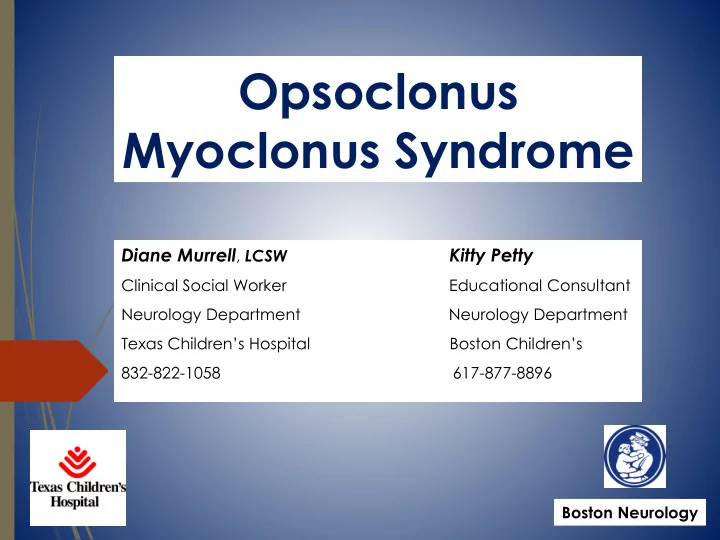

Opsoclonus Myoclonus Syndrome Diane Murrell , LCSW Kitty Petty Clinical Social Worker Educational Consultant Neurology Department Neurology Department Texas Children’s Hospital Boston Children’s 832-822-1058 617-877-8896 Boston Neurology
Goal: To describe psychosocial support that will benefit the parent of a child with OMS, and, benefit the child with OMS in the home and school setting. Objectives: 1. Participant will be able to discuss the effect of a diagnosis of OMS on a parent’s life 2. Participant will be able to explain an IEP and it’s purpose 3. Participant will be able to identify 1-2 approaches to increase positive parenting skills
SELF CARE FOR THE PARENT Research emphasizes the importance of the parent’s emotional well -being to assist the child in gaining positive outcomes Providing support for yourself may include Understanding the notion of medical trauma Understanding the notion of a tight rope, balancing btw living today and preparing for tomorrow
Self Care Self care includes looking at the notion of medical traumatic stress on receiving a devastating diagnosis Medical traumatic stress What is medical traumatic stress How does it affect some people How do you address it so it does not negatively impact your life
Medical traumatic stress refers to, The psychological and physiological response of the parent (or child) to pain, injury, serious illness, medical procedures, and invasive or frightening symptom or treatment experiences. It includes a fear of the future because the certainty and safety of the present has been challenged For some parents the response to their child’s diagnosis may be medical traumatic stress
What contributes to the sense of trauma The journey to diagnosis may be traumatic 1. Opsoclonus myoclonus ataxia is a diagnosis that is unexpected and unknown 2. Words associated with OMS that evoke the same sense of shock or trauma are: Neuroblastoma, Tumor, Cancer 3. OMS is a rare condition 4. There is a lack of shared public knowledge about OMS 5. Out-dated knowledge about OMS and lack of knowledge about new treatments leads to low expectations of outcome
The following feelings may result from the parent’s sense of medical trauma Loss of feelings of safety and security . May cause fear, hopelessness, powerlessness The parent’s response may affect the child , may create anxiety in the child, the child may develop a self-perception of being disabled. The parent may become over protective Free floating feelings of anxiety, anger, depression, guilt, fears If not addressed this may ultimately lead to ongoing stress and anxiety for the parent and a failure to progress through the normal developmental stages of independence by the child
If you have experienced feelings of trauma stress here are suggestions Trauma informed care is an approach to engaging people with a history or incident of trauma. It recognizes the presence of trauma symptoms and acknowledges the role trauma plays in their life. Psychological First Aid: Your perception of how terrible this is, is real, to you. Acknowledge your physiological response . Acknowledge your senses Validate the shock . Respect the emotional response. Don’t allow others to intellectualize it and rationalize it away. Accept grief and anxiety as normal You need friends who can provide empathic listening. Talk about it. Allow time for yourself to absorb the shock and process feelings . Should you continue at a high level of anxiety or inhibit the child from developing on a normal trajectory of psycho- social development then locate a mental health provider / counselor
Systems of Support and Care ECI / financial/ medical PPCD team Government school programs place of faith parent family relatives counselor therapist support groups: friends Online OMSLIFE insurance Foundation In person
Journey through the diagnosis diagnosis diagnosis my life
A djustment to diagnosis diagnosis (OMS) OMS Focus on family values which are larger than the diagnosis
Preventing and Coping with Burn-Out Parent reactions: “Trauma brain” - unable to retain info, forgetfulness, difficulty problem solving • Emotionally overwhelmed • Overwhelmed by tasks • Feel helpless Realistic goals: nothing is too small a goal to set Reach for the incremental steps of progress – not perfection Reduce blame and criticism of self and others and child Recognize negative feelings and frustrations about disease management as normal and important to voice Barbara Anderson, Ph.D. Section of Endocrinology Texas Children’s Hospital
Organize your story so the diagnosis does not become your sole identity OMA is a problem You are the expert on your saturated story – the story. You re-write your disease is a journey that family’s story allowing lasts a different length of positives in time for each family but the story can be altered, 1. Survival questions changed, re-negotiated, externalized 2. Support questions 3. Esteem questions
Survival questions How have you managed to survive or thrive thus far, given all the challenges you have had to contend with? How have you been able to rise to the challenges put before you? What was your mind set as you faced these difficulties? What have you learned about yourself and/or your world during these struggles?
Support questions Who has given you special understanding, support or guidance on this journey? Who are the special people on whom you can depend? What is it these people do for you that is exceptional? What did they respond to in you? Which associations, organizations or groups have been especially helpful to you in the past?
Esteem questions When people say good things about you, what are they likely to say? What is it about your life, yourself and your accomplishments that give you real pride? How will you know when things are going well in your life? What gives you genuine pleasure in life?
I have what it takes to walk the tightrope
Recommend
More recommend